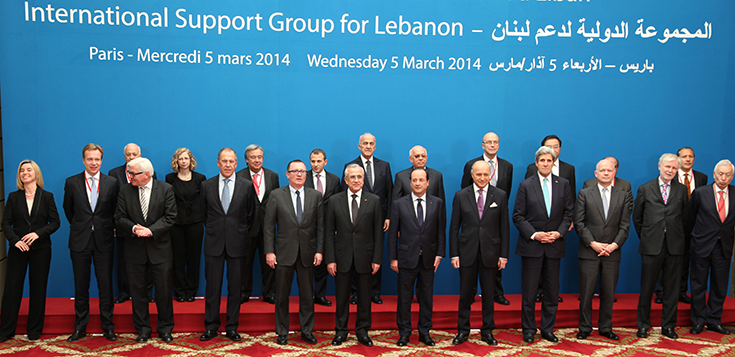President Hollande, President Sleiman, Under Secretary General Feltman, Excellencies,
Let me first congratulate President Sleiman and Lebanon for their reaching a consensus on a new government.
I would also like to thank President Hollande and the Government of France as well as the United Nations for hosting this meeting at such a critical time. As just reminded by Antonio Guterres, the Syrian conflict is a humanitarian calamity of unprecedented magnitude, with massive inflows of Syrian refugees increasing by the day and spilling over into the entire Middle East. Lebanon is receiving the largest number and greatest share relative to its population, with nearly a fourth of its pre-crisis population.
Lebanon's open borders policy and the generosity of its people come at a price that the country should not be asked to shoulder alone: (i) insecurity; (ii) strain on public services and infrastructure; and (iii) escalating competition for jobs are part of this price. In a report that we presented at the United Nations General Assembly in September, we drew an alarming picture: by end 2014, an additional 170,000 Lebanese will be pushed into poverty; an additional 300,000 will lose their jobs; and the total economic cost will reach staggering amounts counted in billions of dollars.
The international community, through the UN and other partners, has mobilized its resources in support of the Syrian refugees to address the humanitarian dimension of this crisis. Let me acknowledge here the admirable work undertaken by UNHCR and the broad UN family, and praise our solid cooperation.
But a paradigm shift is needed. As the crisis continues and deepens, it has become clear that there should be a shift towards a parallel and simultaneous engagement on the humanitarian and the resilience fronts at the same time, so to address (1) the immediate needs of the refugees and (2) to build and strengthen the hosting communities' resilience. My colleagues and I are working closely together with our UN and donor partners to build and strengthen this simultaneous humanitarian/development drive, so to support Lebanon as it struggles with what has become an existential threat to the country.
It is with that fierce urgency in mind that we have moved forward and agreed with the Lebanese government on a Roadmap for the economic and social stabilization of the country, presented at the last World Bank Annual Meetings and which is now a reference point for the international community in our support of Lebanon.
In response to the call from the Government of Lebanon to set up a financing mechanism that will allow for the international community to channel funding and assist Lebanon during this time of dire need, the Bank has created a Multi Donor Trust Fund that will serve as a recipient of grant-financing from donors and partners, so ladies and gentlemen we are open for business. In managing donor resources, we will underwrite forthcoming development and resilience projects targeting the communities that are bearing the brunt of the refugee crisis.
I wish here to salute Norway for taking the lead to provide generous contributions. I encourage all partners to endow this mechanism as a reliable, efficient and transparent conduit for financing. The fiduciary seal of the World Bank is there to secure all transactions. Our engagement serves one purpose: relieve the economic and social stress Lebanon is experiencing.
We look forward to moving jointly in supporting Lebanon as it faces adversity. The UN family in Lebanon is working as one, and will build strong coordination mechanisms with the new government.
Stepping up support to help Lebanon cope with the impact of the Syrian crisis is our collective responsibility. It is not only vital for Lebanon, but is also critical as we strive to contain the conflict in the region. Let me echo what the President of the World Bank Group, Dr. Jim Kim, said at the first ISG meeting in New York a few months ago: “If there ever was a time to help Lebanon, the time is now. If we don't act decisively, now and fast, the Lebanon that we know today will not resemble the Lebanon that we'll be faced with tomorrow.”
Thank you.

